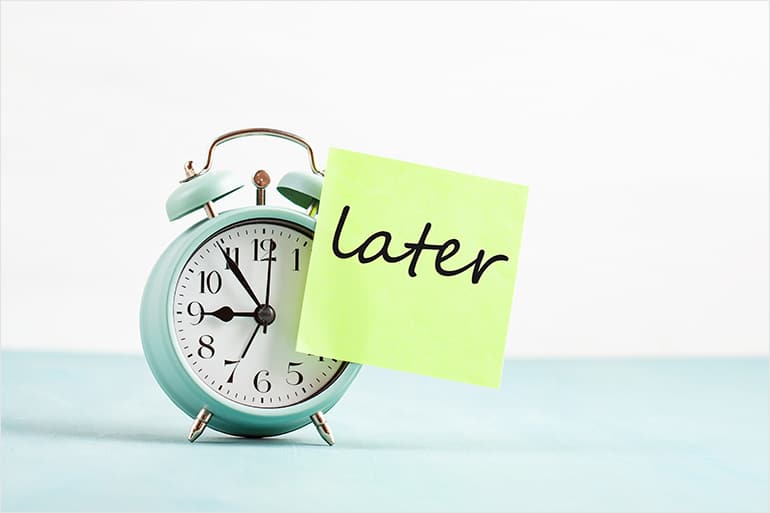Procrastination. We all experience it to some degree. If you never have, please write to me and let me how you’ve managed without it. There is a lot written about it, and much advice given is somewhat helpful. But there is a conceptualization of procrastination that is rarely presented, yet this conceptualization can lead to a more actionable plan to *overcome* it. I placed overcome in asterisks because even using that word is already setting us up for defeat. I’ll explain later. First, let me tell you exactly what procrastination is: it’s a form of escape avoidance, a common – oh, so common – coping strategy. It’s maladaptive, no doubt, as are a lot of modern life’s coping strategies. It involves emotional, cognitive, and behavioral avoidance of something that causes distress with the goal of regulating emotions at the moment. It falls in the category of what I call “short-term gain for long-term pain” behaviors.
Then time moves on, of course, and the deadline for your task completion approaches. As time grows short, thoughts related to the task grow increasingly uncomfortable. Thoughts such as, “Oh my, I don’t know how I’ll get all this done” become common and hard to ignore. The increasing level of discomfort leads to further avoidance. Doing the work – in the decreasing amount of time – seems more and more overwhelming and more upsetting to think about. At the same time, there is an increasing upset with the thought of not getting the work done. The internal civil war escalates: the dread of doing the work is counterbalanced by the dread of not getting it done. The tension can become intense and culminate either in a last-minute rush of activity that may or may not be one’s best work, or it leads to a continuation of the avoidance and lack of completion of the work, often accompanied by self-recrimination and real-world consequences, such as getting bad grades or getting fired.
Often, the easiest time to intervene in the procrastination cycle is in its early stages, shortly after the task is assigned. Both the dread of doing the work and of not getting it done are at lower levels. Nevertheless, we often don’t do the work, although doing so at this stage would be less stressful and unpleasant than when done at the last minute. But we don’t compare how it feels working now with how it will feel working in the future. Rather we compare the feeling of working now against not working now. And the not working now wins.
So, as I conceptualize it, the easiest time to stop the procrastination cycle is early in its course, even though we often don’t take advantage of this. The question is, therefore, what would it take to start working on the task as soon as it is assigned? Given our understanding of escape-avoidance mechanisms, the solution is exposure, as in exposure therapy. In our case, the exposure is to the work of completing our assignment, and it can be gradual or graded. And this brings me to the gentle exposure to take as soon as you receive an assignment:
- Tell yourself that you do not expect yourself to do any work on this assignment at this time. Rather, your job today is just to gather information.
- Review the nature of the assignment carefully. What exactly is the deliverable? Often, procrastinators don’t read the details of the assignment because even a brief initial focus starts a train of uncomfortable cognitions and feelings. In other words, the escape-avoidance starts so early that the person never clarifies exactly what they need to do. But learning the project deliverables, when separated from doing the work, is a low-anxiety task and a good starting point.
- Next, consider and plan out the work you’ll have to do to accomplish your assignment. You’re not doing the work yet (or so you think). Rather you’re planning it out. Make a list of required actions. At this point, you’ve already made progress and there may be a palpable decrease in anxious thoughts and feelings and, even, unbelievably, sometimes an eagerness to just get the work done. The big hang-up was imagining something much worse than the reality that has now become clear after a short period of focus and planning.
- Then, you can take a break if you wish. You can sleep on it. Especially when the assignment requires creativity, like writing a paper or preparing a lecture, a period of non-thinking alternating with diffuse unforced thinking helps.
- Next, if the task requires creativity, begin doing the research. Read, look up sources, etc. Jot down notes. Consider how you will structure your article or lecture. Continue in this stress-free exploratory, curiosity-driven manner.
- At some point, a focused effort to bring structure and completion to the project is required. At this point, procrastination may once again rear its head, triggered by scary thoughts of not being capable enough to complete the assignment. The solution is to repeat the earlier sequence of steps. For example, I may tell myself, “OK. Now I have to bring it all together and finish my project. Let me start tinkering with formalizing a structure. I don’t know what will work best, so it’s good that I didn’t wait until the last minute because I can try different approaches.”
Some people may consider themselves procrastinators who aren’t really. Their approach is to wait until the last minute. They may have a track record of success doing this and aren’t filled with angst when not working on their project over the days or weeks since it was assigned. However, even these individuals may produce higher quality work by taking the initial steps of learning the details of the work, considering a plan for completion, and conducting initial exploration or research early in the timeline. Then their unconscious mind has more time to consider creative options while they consciously ignore working on their project.
Last point: I said I’d explain why the use of the term *overcome* may be counterproductive. Overcoming suggests a struggle. Sometimes a struggle will ensue when completing a task, but it need not. I’d like to leave myself open to the possibility of enjoying work on a project and of approaching it with curiosity. Must I assume it will be dreadful? That’s an expectation bias I probably want to leave in the past.
That’s it for today. I’m way behind schedule today because I procrastinated on my writing – really. But I promise to do better — next time.
Dr. Jack
LanguageBrief
“It is easier to resist at the beginning than at the end.” – Leonardo da Vinci
“My mother always told me I wouldn’t amount to anything because I procrastinate. I said, ‘Just wait.” – Judy Tenuta
“Rejection is more valuable than inaction. All that I have learned until now has been because of rejections. Inaction didn’t teach me a thing.” – Neeraj Agnihotri







Leave A Comment